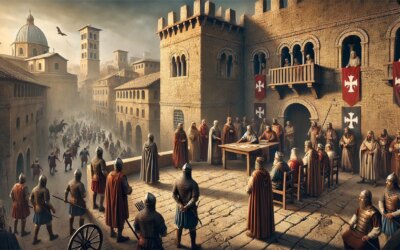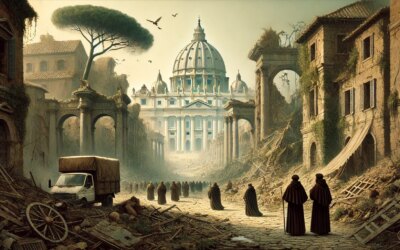A New Emperor for Christendom
On December 25, 800 CE, inside the grand halls of St. Peter’s Basilica in Rome, a momentous event took place—Pope Leo III placed a golden crown upon the head of Charlemagne, declaring him the Holy Roman Emperor. This coronation marked the beginning of the Holy Roman Empire and cemented the alliance between the papacy and the Frankish kingdom.
The Rise of Charlemagne
By the late 8th century, Charlemagne had established himself as the most powerful ruler in Western Europe. As King of the Franks, he expanded his territories through military campaigns, uniting vast regions under his control. His rule brought stability to lands that had been fragmented since the fall of the Western Roman Empire in 476 CE.
Pope Leo III and the Need for Protection
Pope Leo III faced significant opposition in Rome and was nearly overthrown by political rivals. Seeking protection, he turned to Charlemagne, who marched into Italy, secured the pope’s position, and restored order in Rome. In gratitude, Leo III sought to legitimize Charlemagne’s rule with the ultimate honor—a Roman imperial coronation.
The Coronation in St. Peter’s Basilica
On Christmas Day, during a solemn mass, Pope Leo III unexpectedly crowned Charlemagne as “Emperor of the Romans.” According to historical accounts, Charlemagne was caught off guard and later claimed he would not have entered the church had he known of the pope’s intentions. Whether or not this was true, the event symbolized the rebirth of imperial rule in the West.
The Holy Roman Empire and Its Legacy
Charlemagne’s coronation had far-reaching consequences. It strengthened the papacy’s role in political affairs and solidified the concept of a unified Christian empire in Western Europe. His rule laid the foundation for medieval European governance, influencing monarchs and emperors for centuries.
A Turning Point in European History
The coronation of Charlemagne reshaped the destiny of Rome and the broader medieval world. It bridged the gap between the ancient Roman tradition and the emerging feudal order of Europe, ensuring that Rome, despite its turbulent past, remained central to European power and faith.





